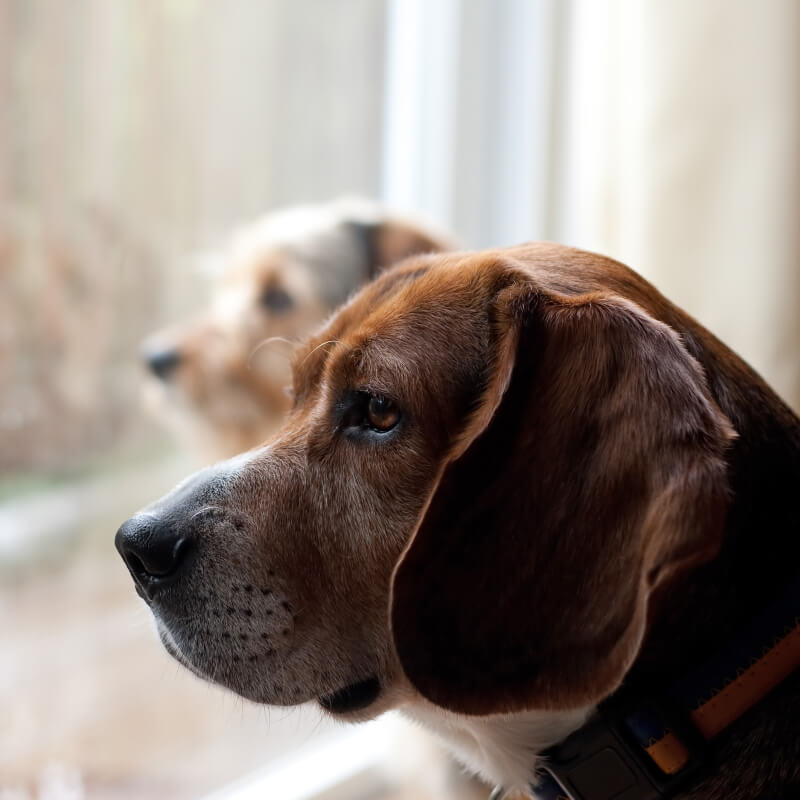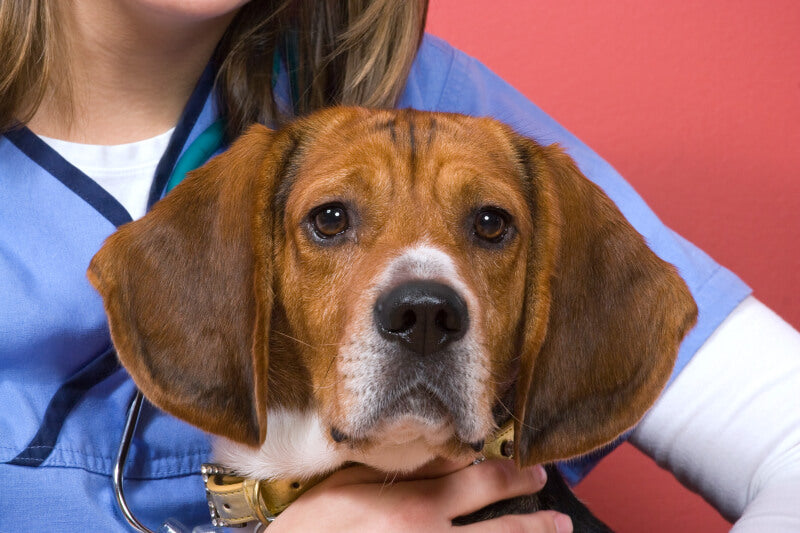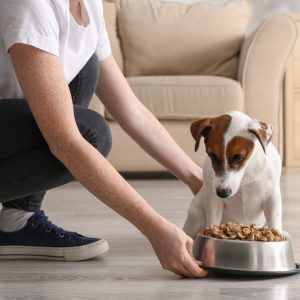If your senior dog has nighttime anxiety, which may manifest as panting, pacing, and whimpering, aid is available. After you’ve learned the reasons and received six remedies, everyone in your home will be able to rest, relax, and recharge after the sun has set.
Are you able to identify with these pet parents?
I was excited to speak with my new customer about the possibility of acupuncture for his elderly dog, who was suffering nighttime anxiety. As he described the difficulties he and his wife were experiencing, I could detect a mixture of despair and tiredness in his voice. He had reached the end of his rope and was uncertain of where to turn for assistance.
His wife, who was responsible for the dog’s daily care, was on the point of having a “nervous collapse.” Those were the exact words he used. She was a light sleeper, as were many other ladies her age. She was also completely committed to their pet dog, and she was determined to give him the finest care possible at whatever cost to the family.
Every night, she was roused by the panting and pacing of their dog. After getting out of bed and attempting to calm her agitated dog by putting him outside, providing him with plenty of freshwater, turning on a fan, and going to another room in the house, she would eventually give up and give up altogether. It was a nightly routine for the duo, which continued until the fatigued dog and mother eventually crashed together in the early morning hours of the next day.
Unfortunately, this is not an exceptional instance. All-too-common among senior dogs is the experience of nighttime dread. The issue, just as it did for my new client and his wife, has the potential to have a significant negative influence on everyone’s quality of life.
The significance of obtaining an accurate diagnosis
Clients want vets to make their pets well—to “cure” the symptoms, in other words, to make them feel better. They are looking for a therapy plan that includes specific action actions. Their main concern is understanding what will happen and when it will happen. That makes sense. As a dog parent myself, I know what you’re going through.
However, as a veterinarian, it is difficult, if not impossible, to develop an educated treatment plan without first comprehending the “why” behind the “what” in question. It is possible that your dog is not sleeping at night, but we must first determine the cause of this before providing the appropriate remedy.
How can veterinarians determine if a senior dog is experiencing nighttime anxiety?
A thorough history and physical examination are critical initial steps. To begin, your veterinarian and their team will ask you questions and take comprehensive notes on what is occurring with your dog during the nighttime hours. This is referred to as “taking a history.” After that, they will conduct a comprehensive physical examination and administer several tests.

What causes anxiety in a senior dog when alone in the evenings?
Now it’s up to your veterinarian to do what they do best: play detective and put the puzzle pieces together to find out why your dog is panting, restless, and worried in the first place.
Several different factors often bring on anxiety at night in older dogs. Let’s take a quick look at each of them in turn.
Canine cognitive impairment is characterized by the following:
Canine cognitive dysfunction syndrome (C.C.D.S.) is the most prevalent cause of anxiety in elderly dogs (C.D.S.). Despite the lengthy term, it simply indicates that your dog’s brain is not operating correctly. If your dog’s mental abilities and awareness are impaired, you will recognize this condition as soon as you detect it. Canine cognitive dysfunction syndrome (C.C.D.S.) is often compared to canine Alzheimer’s disease.
According to the American Veterinary Medical Association, when there is no evidence of cognitive impairment, your dog may be worried at night if he is in discomfort. If your dog is experiencing pain, a thorough examination along with your observations should assist your veterinarian in determining the cause of the discomfort.
While arthritis and musculoskeletal pain are widespread, there is also the possibility of neurogenic pain, often known as nerve pain. It is usually essential to get a proper diagnosis to customize therapy to the patient’s needs to treat neurogenic pain properly.
There are a variety of other causes of senior dog worry at night.
Listed below are some of the other prevalent disorders that might cause restlessness and anxiety in senior dogs throughout the night. These conditions would be detected by standard diagnostic testing.
Disease of the intracranial space
An additional factor to consider is an intracranial illness, which is in addition to the ones already mentioned. Inflammation of the intracranial space is a disorder that begins in the brain (such as a brain tumor or other type of inflammatory brain disease).
A veterinary referral facility or veterinary school will do an M.R.I. or C.T. scan on the patient to get a precise diagnosis. Although not every dog parent can afford or go to a veterinary hospital to take advantage of these sophisticated diagnostic imaging alternatives, it’s comforting to know that they are accessible if needed if the situation calls for them.
What should you do if your senior dog has nighttime anxiety?
Once you’ve figured out what’s causing your dog’s nocturnal anxiety, it’s time to speak about possible treatments. It’s important to remember that diagnosing someone might be difficult. Don’t give up if you don’t get a firm answer on your initial visit to the veterinarian. It may take multiple trips and a great deal of thorough observation on your part to piece together the whole scenario.
-
Make dietary modifications.
Many veterinarians will advocate switching to a prescription food with brain-boosting ingredients since it is a simple modification that may reap significant benefits. Although I’m usually the one who recommends a custom-formulated, home-cooked food over a prescription diet, in this instance, I’m siding with those who advocate for prescription diets instead.
Hill’s® Prescription Diet® b/d Canine is one option for “brain aging care,” as is Purina® Neuro Care and Purina® Bright Minds. Hill’s® Prescription Diet® b/d Canine is another option for “brain aging care” (which represents the Purina veterinary prescription diet and the over-the-counter version, respectively). It may take many months to notice improvements from these diets, but they effectively treat cognitive impairment. Customers and colleagues have reported the usage of Bright Minds as effective in alleviating nocturnal anxiety in some dogs, which may have been the case since the underlying problem in those instances was C.D.S.
-
Increase your physical activity and mental stimulation throughout the day.
Another straightforward tip is to boost your dog’s daily exercise routine as well as his mental stimulation throughout the day. Exert some additional energy by making an extra loop around the neighborhood and consider cognitive challenges and canine puzzles. With a quick web search, you may find hundreds of ideas and items that are meant to test your dog’s cognitive abilities.
-
Don’t cause a commotion.
For example, anxiety in elderly dogs may occur when their daily routine is disrupted. Maintaining a healthy, regular nightly schedule may benefit everyone, including seniors. If your senior dog has suddenly acquired strange anxiety-related behavior at night, the first step is to seek “triggers” that are causing it. Is there anything new that has happened recently? Also, please make confident that your dog has easy access to their chosen resting spot as well as a wonderfully lovely bed to sleep in. Oversized memory foam beds are an excellent option for anyone with creaky elderly joints.
-
dietary supplements made from natural ingredients
There are a variety of natural supplements for dogs available that may be beneficial for elderly dogs experiencing nighttime anxiety. These are things that you should look into and discuss with your veterinarian. Frequently, they will be used in conjunction with one another:
Medications are number five.
There are a variety of pharmacological alternatives available for dogs suffering from C.D.S. and anxiety. Although the list is lengthy and expanding as pharmaceutical firms produce new possibilities, the following are more specific options. These are often used in conjunction with one another and in conjunction with supplements as “combination treatment.”
Because every dog is unique, a period of trial and error will probably be required to determine which “combination treatment” is the most effective for your dog. To emphasize the significance of working closely with your veterinarian while beginning, changing, or discontinuing your dog’s medication regimen, consider the following:
Sleep is essential for both your dog and yourself.
If you can connect to the dog parents in this story who are fatigued, I implore you to get help from your local veterinarian. You are not obligated to suffer in solitude. Sleepless evenings are not something that can be sustained. They will harm your health, the health of your dog, and your entire well-being. Although it is not as straightforward as detecting lameness or a dental problem in your dog, your veterinarian is prepared to assist you in addressing nocturnal anxiety and restlessness in your dog.




Add comment